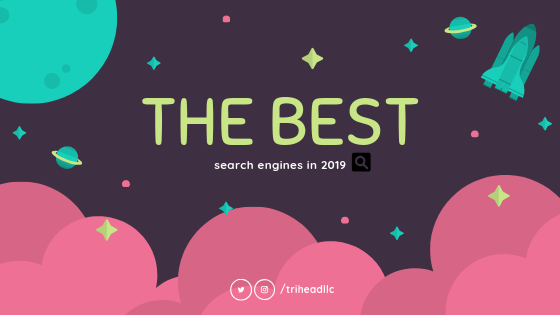For most of us, search engines are the gateway to the Internet. When we have a question, what’s the first thing we intuitively do? We Google it.
Understanding why people use Google—and how they use it—is essential for search engine optimization (SEO) companies like us. And here at triHead, we pride ourselves in the affordable SEO services that we offer.
Whether you’re sat behind your desktop computer in the office, on your laptop in the cafe, or on your smartphone while on the move, chances are that you use Google as your search engine to look things up.
For most of us, we only think of Google when we need a search engine. That’s especially true when considering that 92% of web searches were carried out on Google worldwide.
This is because of several reasons. Chief among them is that Google Chrome has 63% of the browser market share. And on Chrome, and many other browsers, the default search engine is Google.
Another reason is that Google’s smartphone operating system, Android, dominates 75% of the mobile operating system market share. And Google promotes its services, web search chief amongst them, on Android.
And we already know that most people don’t mess with their default service providers.
But another reason is that Google’s algorithms really are the best for a web search service provider. In fact, I challenge you to find a search engine as good as, leave alone better than, Google.
But that doesn’t mean that Google is the only search engine. Far from it. And though Google is great for looking things up on the Internet, it has its flaws too. This is where its competitors come in.
In this blog post, we will look at areas where it has clear weaknesses and flaws, and suggest multiple search engines and search aggregators that do the job better.
But before we push on, let’s start with the basics…
Search engines vs aggregator/metasearch engines
Most of us know what a search engine does.
They send crawler bots—pieces of code—all over the web looking for websites. Once they find them, they list them down. This is called indexing.
Once a website is on the list, or indexed, whenever someone looks up information that that website offers, the search engine lists them.
Well, search aggregators (also known as metasearch engines) don’t index website. They pull information from search engines like Google and present searches based on their own algorithms. This is useful in several scenarios.
One example would be in academia. When you’re looking up academic papers, usually you’re looking for papers published in journals, reliable academic articles and other related literature and resources. Search aggregators like CORE do a great job of doing all that.
In this blog post, we’ll be covering quite a few search aggregators and search engines. It’s important to differentiate between the two.[/vc_column_text][vc_column_text]
Why do most people use Google?
We all know why Google is so popular. But this is a great time to think about what people look for in a search engine.
With Google, there are lots of benefits to using it.
- Google is blazing fast.
It’s perhaps the fastest search engine out there. Google can fetch billions of results in less than a second. This is outrageously fast. One thing we all take for granted in 2019. - Google is pinpoint accurate
I’m on the Internet a lot, so I do web searches all day long. But I can count on one hand the number of times I had to go to the second page of Google’s search engine results page (SERP). For most of us, what we’re looking for is often one of the first 10 hits. - Google finds related terms
There have been many times when I was looking for something but didn’t quite know how to be more specific with my web search. But Google didn’t let me down and helped me by suggesting related terms. - Google is smart.
This is clear in how it presents information.
If you Google “Starbucks”, Google might show you several locations in your town, link you to their website, provide you with a series of frequently asked questions about their drinks, help you find their social media accounts, offers rich snippets and knowledge graphs telling you all about Starbucks’ history, and list news articles featuring Starbucks. As you can see, Google offers a plethora of information quickly and effectively. They value presenting structured data in an easily understandable fashion So, for other search engines to succeed, they need to either match Google in some of these areas or perform better than Google in areas where Google is at a natural disadvantage.
And there are quite a lot of areas where Google is at a natural disadvantage.
Mainstream Competitors
In 2019, there are very few actual competitors left to Google. This is because, over the last decade and a half, Google has worked hard to establish itself as the best search engine out there.
Still, there are a few challengers left in the arena.
Yahoo!
Back in yesteryear, Yahoo! was neck deep in competition with Google. But Google displaced it as the dominant search engine. This is clear given that when we want to look something up, we don’t say, “Yahoo! It!”, but “Google it!”
In fact, since 2010, Yahoo has been outsourcing its web search inquiries to Microsoft’s Bing.
Interestingly, Yahoo! Japan has the biggest Yahoo! market share in the world at 21% as of May 2019.
Bing
In 2006, Microsoft released its own search engine, Live Search. Microsoft replaced Live Search with Bing in 2009, marketing it as a “decision engine”, intended to present more results in each Bing results page.
Through a series of agreements with Yahoo! and Facebook in 2010 and 2012, respectively, Bing increased its dominance in the market by becoming the second most used search engine in the United States as of 2016.
The 2010 Yahoo! deal saw Microsoft powering all Yahoo! searches. This is big for the web search industry.
Baidu
The Chinese search engine Baidu has its origins in RankDex, an earlier iteration of the search engine developed in 1996 by Baidu founder Robin Li before he founded Baidu in 2000.
RankDex was the first search engine to rank indexed websites on their quality based on their use of hyperlinks.
In 2001, Baidu introduced an approach allowing advertisers to bid for ad space, much like Google Ads. This predated Google’s advertisement strategy.
Baidu is the industry leader in China, with 65% of the search engine market in the world’s most populous nation under its belt. By contrast, Google has 3.2% of the Chinese market share. This is because the Great Firewall of China bans Google and all its services in China.
In 2018, The Intercept reported that Google was planning to launch a censored version of its web search platform in China, in a bid to secure the Chinese Communist Party’s permission to return to China.
The Intercept found a memo shared by a Google engineer regarding an app that Google was developing for both Android and iOS, “Maotai”, that would allow Google to log users’ private information (like their names, IP addresses, geolocation and websites that they visit) and share them with the Chinese authorities.
In December, The Intercept reported that Google’s China project has been “effectively ended”.
But this all raises another point that I hope to go over in this blog post…
Privacy
Google is notorious for its perceived privacy violations.
The keyword here is “perceived” because much of what we discuss now will be based on what you perceive as important to your online privacy.
Privacy concerns surrounding Google aren’t new. In 2007, for example, Privacy International gave Google the worst ranking on a report ranking various organizations on respecting digital privacy.
More recently, Google quietly dropped its ban on personally identifiable web tracking techniques in 2016.
And as we saw above, Google looked into developing tools that would enable it to spy on Chinese users on the Chinese Communist Party’s behalf.
These privacy concerns have brought about several privacy-focused solutions.
DuckDuckGo
The US-based privacy-focused search aggregator is based around Microsoft Bing’s search engine. DuckDuckGo promises to respect users’ privacy by not tracking search inquiries made through its search platform.
It also attempts to avoid Google’s online filter bubbles. Online filter bubbles, coined by Eli Pariser, is the term used to describe the web adapting around a specific user’s beliefs. Websites like Google track their users’ activities to better understand what their interests are and serve results based on their understanding of each specific user.
The concern here is that over time we aren’t exposed to a diverse set of ideas, meaning that we don’t learn from each other—going contrary to one of the early promises of the Internet: drawing people together.
Another great feature DuckDuckGo has is its Bangs. These are shortcuts that help us quickly search results on other websites.
For example, doing a simple DuckDuckGo search “!w online filter bubble” will take us to Wikipedia’s article on online filter bubbles.
Despite DuckDuckGo respecting user privacy, they too aren’t perfect. Noted privacy enthusiast Christian Stewart wrote in a Medium post on a flaw where the search aggregator doesn’t use forward secrecy on a local level, therefore storing your searches plain-text in your browsing history.
Others point out that DuckDuckGo is hosted in the US (is subject to the Patriot Act) and is hosted by Amazon (which they perceive as disregarding privacy more than Google).
Startpage
Startpage calls itself a private search engine but is, in reality, a search aggregator that relies on Google to return results. But it takes many measures to ensure that its users aren’t tracked by Google.
One such feature is its “Anonymous View” functionality. When clicking on a link, your browser establishes a direct connection between you and the third party website. This allows the website to track you.
Anonymous View allows you to visit websites through Startpage’s Proxy, which counters many browser fingerprinting and device printing tracking techniques.
The fact that Startpage is hosted outside the United States, and that it isn’t hosted by Amazon Web Services, serves as a great relief to many privacy enthusiasts.
These anti-tracking measures help fight against filter bubbles.
In conclusion…
Google is a great search engine, and that’s why it dominates the web search market segment.
It’s accurate, blazing fast and helpful.
But people still use alternatives to Google. And to understand Internet users’ online behavior, we have to explore the reasoning behind using other search tools for your search queries.
By understanding the benefits of using alternative search engine platforms, we can better leverage it for business by providing excellent online marketing services.
We learn, for example, that Microsoft Advertising, previously known as Bing Ads, is a cheaper alternative to Google Ads. Not to mention, there’s less competition.
Or by understanding Baidu’s advertisement model, our clients can leverage it to increase their sales in China, the world’s fastest-growing economy.
And here at triHead, we’re happy to help you with your online marketing campaigns. We have an extensive and thorough keyword research process that includes all popular search engines and meta search engines.



